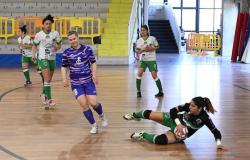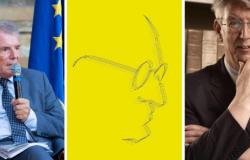April 16, 2024 07:58
“I hope that this evening’s reflections have contributed to giving more soul to our actions and that they help us to expend our daily passion which certainly arises from an experience of faith, but which represents the heart that animates our service as citizens” . Thus Archbishop Claudio Maniago closed the proceedings of the meeting organized in Catanzaro, in the conference room of the “Banca Centro Calabria” in the “Germaneto” area.
in preparation for the “Catholic Social Week” which will be held in Trieste from 3 to 7 July.
A qualified and important meeting, organized by the Diocesan Office of Social and Labor Pastoral Care directed by Don Gaetano Rocca and moderated by Don Bruno Bignami, National Director of the Office of Labor and Social Pastoral Care.
Bignami highlighted that “the “Social Week of Catholics” represents a very important significant stage, so much so that the Pope has also ensured his presence in Trieste: it has the task of imagining something new at a time when the Church is also busy to listen and ask questions in the ongoing synodal process. And this year’s event is called to reflect on the crisis of participation, referring not only to the fact that people do not go to vote, but also to how we are experiencing the theme of social and political participation, with the crisis of democracy and of ties in our territories”.
In the audience a large representation of mayors, municipal and provincial administrators, pastoral workers and citizens, gathered to listen to the discussion on the theme of democracy which saw as protagonists Monsignor Luigi Renna, President of the Organizational Secretariat of the Social Week and Professor Andrea Riccardi, founder of the Community of Sant’Egidio.
Riccardi recalled that “the Social Weeks are a turning point and have often proved decisive in the contribution given by Catholics to the constituent processes of Italy and, in particular, to the drafting of our constitutional charter”.
Remembering Paul VI, Riccardi underlined that “the world suffers from a lack of thought, a lack of ideas and a lack of a dream, a vision of the future. In this sense the theme of imagination turns out to be truly decisive.”
“The common good – added Riccardi – has been eclipsed for a series of reasons, among all, the cultural climate revolution with the transition from the society of us to the society of the I. A Social Week is a great us convened to imagine and discuss.” “Today politics insists a lot on efficiency, governability and little on the global vision of the society we want. We cannot give up the prospect of the common good, because it seems to us to be an objective of the future: we cannot meet the global world in a fragmented way, but we need a “common home”, an integrated Europe , if we do not want to live the global world as defeated, it must be a world made of alliance and rediscovery of the common good: we must rediscover the dimension of participation in the common good”.
Monsignor Renna also wanted to highlight that the Social Weeks are not a conference, but a process. They were born when Catholics did not have their own party, women and men who wanted to reconstitute the richness of a thought. It’s about obeying the trinomial “being able to do-being able to change”: it’s the power of participation that doesn’t take up space, but says I’m here! The point of reference is the Social Doctrine of the Church which gives us contents and a method, placing the person, society and the common good at the centre. At the center of this event is the great teaching of Pope Francis’ encyclical, Fratelli tutti, which helps us redefine the concept of people and democracy.” Regarding the presence of Catholics in politics, Monsignor Renna specified that “history does not repeat itself and we must be careful not to repeat a narrative from the past, but find authentically new forms, because old acronyms are being created with old people. Through the “Thematic Squares”, in Trieste and subsequently in the territories, we hope that the Social Weeks will become a model to be exported and generative of a way of doing things”.
The work of the round table was enriched by the contribution of Monica Tripodi, regional manager of Social and Labor Pastoral, who presented the state of the art of Calabria’s path towards Trieste and the start of the construction sites of political passion.
The young people also had a proactive and constructive space with the presentation of experiences and testimonies curated by the diocesan manager Francesco Costa.



Tags: Catanzaro community faithful preparing event July




